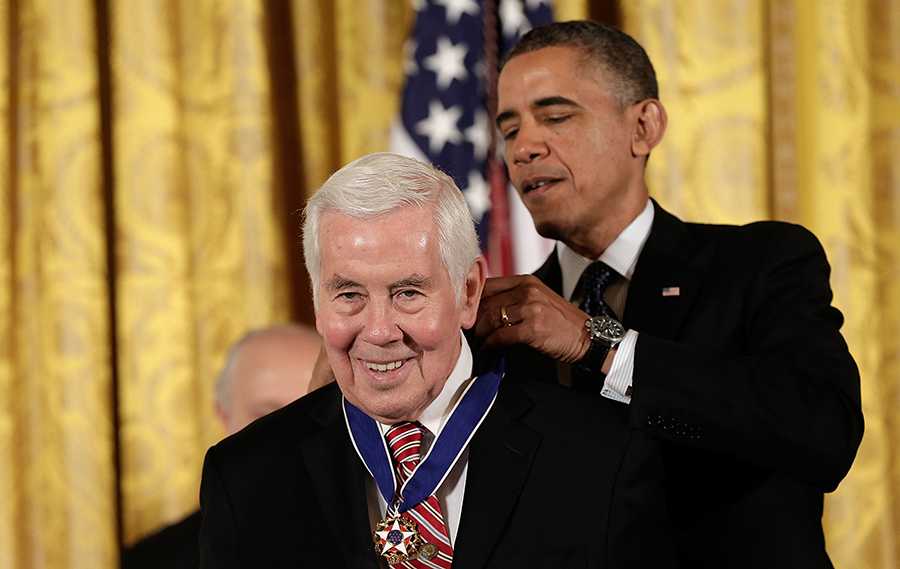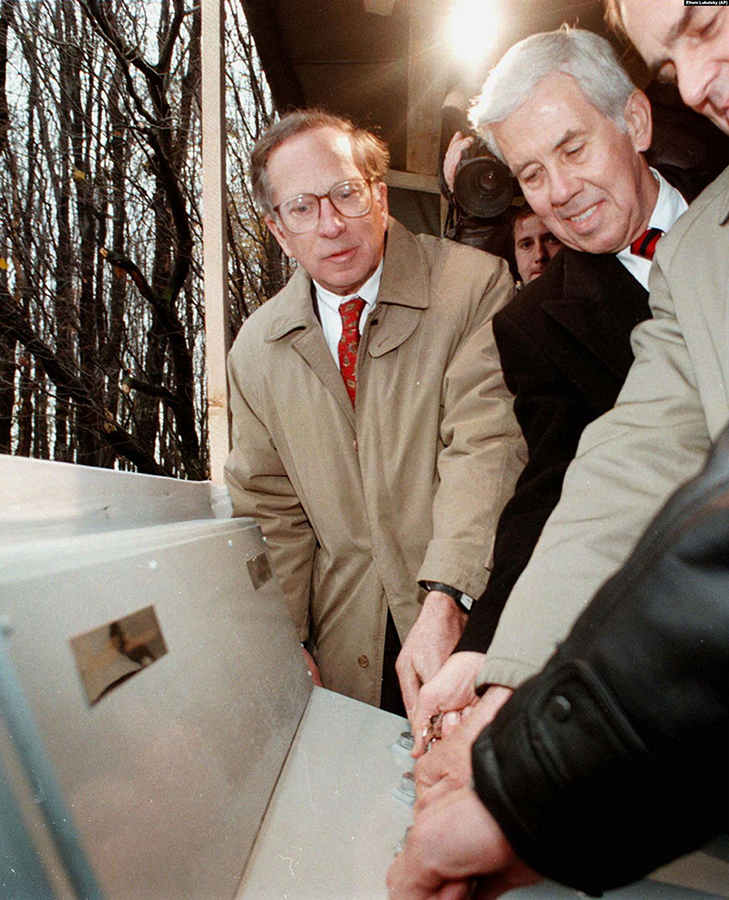“For 50 years, the Arms Control Association has educated citizens around the world to help create broad support for U.S.-led arms control and nonproliferation achievements.”
Richard Lugar (1932–2019), A Special Kind of Conservative
June 2019
By Edward P. Levine
Richard Lugar, a six-term Republican senator from Indiana, died April 29 at the age of 87. He was known popularly for three achievements: being “Richard Nixon’s favorite mayor” in Indianapolis; co-founding the Nunn-Lugar Cooperative Threat Reduction (CTR) Program; and helping to end U.S. support for South Africa’s racist regime and for electoral fraud in the Philippines. Those were all great accomplishments, but equally great was the example he set, as a person and as a public servant, of simple human decency.
 President Nixon’s approval was both an honor and a media albatross around Lugar’s neck. He appeared to accept both with equanimity. Lugar was, at heart, a moderate conservative. Both words were important, and the arms control community would ignore the second one at its peril.
President Nixon’s approval was both an honor and a media albatross around Lugar’s neck. He appeared to accept both with equanimity. Lugar was, at heart, a moderate conservative. Both words were important, and the arms control community would ignore the second one at its peril.
The Nunn-Lugar story is instructive. When Senator Sam Nunn (D-Ga.) reached out to Lugar, he provided crucial bipartisan leadership, but he also persuaded Nunn to settle for less initial funding in the 1991 Soviet Nuclear Threat Reduction Act.
Neither Lugar’s success nor his hard work ended there. Yes, he enjoyed the fame and attention that the Nunn-Lugar program brought him. Pictures from his annual inspection trips to odd sites in the former Soviet Union capture a pure joy at seeing what U.S. help could accomplish in safely building down Soviet nuclear weapons; there was a perpetual Boy Scout quality to these adventures. Still, he had to work each and every year, especially under President George W. Bush, to get robust funding for the CTR program. In the world of Senate politics, this meant not just showing off new pictures and artifacts from each of those trips, but also asking powerful colleagues for a favor each year, and so owing favors to them in return. Lugar's willingness to pay back those favors, year after year, was a measure of his commitment to nuclear arms reduction and to keeping former Soviet scientists and technical personnel from becoming proliferation vectors for weapons of mass destruction.
Lugar was not an ideological believer in arms control. From his work on the Senate Select Committee on Intelligence, he knew that monitoring, let alone enforcing, Soviet (and later Russian) compliance was a continuing challenge. As a conservative in both temperament and ideology, Senator Lugar supported downsizing U.S. nuclear forces and our conventional forces in Europe, so long as the Soviet Union and its allies did the same.
Avoiding the use of chemical weapons was also consonant with his conservatism. He was not, however, inclined to give up on a national missile defense, or to foreswear all nuclear testing when the Comprehensive Test Ban Treaty (CTBT) came to a vote in 1999. Democrats who looked at arms control as a binary, yes-or-no choice may have felt that a Republican supporter of the Intermediate-Range Nuclear Forces Treaty, the Conventional Armed Forces in Europe Treaty, the first Strategic Arms Reduction Treaty and the Chemical Weapons Convention (CWC) would surely be with them on the CTBT as well. Republicans, however, were more likely to see arms control on a spectrum and to define their positions on that spectrum as “this far and no farther.” If Lugar finally came around to mild support for the CTBT, long after speaking and voting against it, that was likely because advances in verification technology and stockpile stewardship had rendered his earlier concerns less urgent and because it became more difficult to oppose a treaty that the United States had dutifully implemented for over 20 years. As some Republican arms control experts whom he respected put it, the treaty was finally “a bad idea whose time has come.”
Richard Lugar was an uncommonly decent and soft-spoken man. He was nearly incapable of displaying anger; or rather, he showed anger so subtly that the object of his ire might never realize it. I know that, as a Senate Intelligence Committee staff member briefing Senator Lugar on certain sensitive programs, I sometimes enjoyed his pleasant questioning without realizing until much later that he had disagreed with
my analysis.
Even colleagues could mistake Lugar’s affability for agreement. Senator Jesse Helms (R-N.C.), chairman of the Foreign Relations Committee, was surprised when Lugar maneuvered successfully to prevent him from controlling the committee’s report on the CWC. Majority Leader Trent Lott (R-Miss.) was reportedly surprised and angered when Lugar, after agreeing to take up five Helms amendments to the resolution of advice and consent on the CWC, proceeded to help defeat all of those amendments. The story at the time was that after the CWC resolution was approved in 1997, Lott told Lugar, “You will never get another treaty through the Senate.”
That story may be apocryphal, but Lugar did pay a high price for his foreign policy stands: the loss of his Foreign Relations Committee chairmanship to Helms. When Helms asserted his claim to the chairmanship in 1995, based on seniority, he had to give up the chairmanship of the Agriculture Committee—to Lugar, as it happened. It was a measure of Lugar’s sometimes infuriating decency, or perhaps of the favors he still owed in return for CTR funding, that he did not use his new position to retaliate against Helms, whose home state was vitally dependent upon congressional support for the tobacco industry.
 When the New Strategic Arms Reduction Treaty was sent to the Senate in 2010, Lugar became its chief Republican supporter. Foreign Relations Committee Chairman John Kerry (D-Mass.) and he worked closely together to ensure that the committee’s hearings featured Republican witnesses and military officers who had been promoted to their positions by President George W. Bush. Lugar obtained changes in the proposed resolution of advice and consent that addressed many issues raised by treaty skeptics, and even treaty opponents had to admit that the resolution went the extra mile to meet their concerns. The treaty’s fate remained in doubt almost until the day that floor debate began, however, and while people rightly credit Kerry for being willing to roll the dice, Lugar’s steady support for holding that floor debate and vote during a lame duck session was vital to the treaty’s success.
When the New Strategic Arms Reduction Treaty was sent to the Senate in 2010, Lugar became its chief Republican supporter. Foreign Relations Committee Chairman John Kerry (D-Mass.) and he worked closely together to ensure that the committee’s hearings featured Republican witnesses and military officers who had been promoted to their positions by President George W. Bush. Lugar obtained changes in the proposed resolution of advice and consent that addressed many issues raised by treaty skeptics, and even treaty opponents had to admit that the resolution went the extra mile to meet their concerns. The treaty’s fate remained in doubt almost until the day that floor debate began, however, and while people rightly credit Kerry for being willing to roll the dice, Lugar’s steady support for holding that floor debate and vote during a lame duck session was vital to the treaty’s success.
Finally, working for a senator is never easy; the policy stakes are high and timeframes are demanding, so staff often see a senator at his or her worst. One measure of Senator Lugar’s immense decency was how long key staff members stuck with him. In an institution where the norm is to spend a few years and then move on, several staff stayed for a decade or more. Andy Semmel was his legislative assistant for national security affairs for nearly 15 years. Ken Myers, Jr. was his chief committee staff member for nearly 30 years, and Ken Myers III (Kenny) was with him for 14 years. When Kenny’s twin children were born, Lugar called the hospital room to congratulate Kenny and his wife. “I hear that you named the boy Ken IV,” said Lugar. “Does that mean I have to hire him, too?”
Loyalty went both ways for Dick Lugar. When President Barack Obama took office, Lugar’s one request was that Kenny become head of the CTR program—perhaps in repayment for all of those annual trips Kenny had to organize and take with his boss. Lugar had made a special effort to make Senator Obama feel welcome on the Foreign Relations Committee, and that personal touch paid off. Kenny went on to serve as director of the Defense Threat Reduction Agency for over six years, a record for DTRA directors.
Senator Lugar had a certain strategic patience, in life as in arms control. He loved his tree farm, where he planted walnuts. It takes perhaps six years to get walnuts from a tree, and up to a decade to get high production. His staff told me that he had really planted those trees for the next generation. In truth, he did that in his approach to arms control and nonproliferation as well. He helped to plant several farms that the rest of us now struggle to tend, that we may enjoy their fruits.
Edward P. Levine, a former senior professional staff member of the Senate Select Committee on Intelligence and the Senate Foreign Relations Committee, chairs the board of the Center for Arms Control and Non-Proliferation. He is also a member of the Nuclear Security Working Group.
